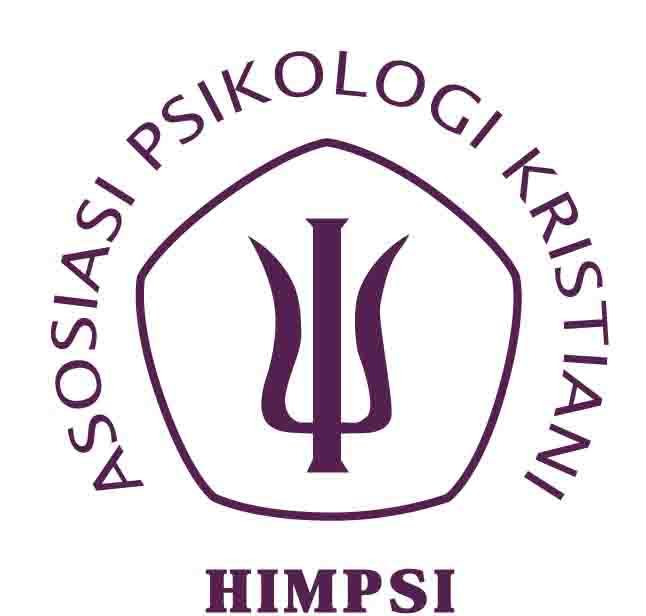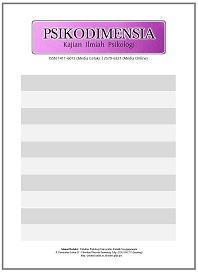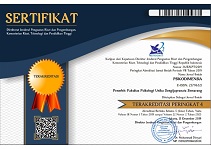HUBUNGAN DUKUNGAN SOSIAL TEMAN SEBAYA, KONTROL DIRI, DAN JENIS KELAMIN DENGAN PRESTASI BELAJAR SISWA DI SMA KRISTEN YPKPM AMBON
Abstract
and gender with student’s learning achievement in SMA Kristen
YPKPM Ambon. The population in this research is the whole students of
SMA Kristen YPKPM Ambon which amounts 797 students, while the
number of the samples that has been used in this research were 168
students. To measure the variable of social support of peers it has been
used questionnaire adapted by Malecki (2002, cited in Dewolff 2012). To
measure the variable of self-control it has been used questionnaire by
Tangney et al (2004) which is then used by Gong, et al (2009) on his
research, while the student’s achievement has been measured using the
report of students education in the first semester period 2013/2014. Before
testing thehypothesis, first is measuring the validity and reliability of
measuring instruments by using a standard p>0.30 for validity and p>0.70
for reliability. After the writer/researcher test the hypothesis, then there are
some research results as follows: there is was relationship of peer social
support and self-control with student achievement, there is no interaction
effect of peer social support and gender with student achievement, there is
no interaction effect of self control and gender with student achievement,
there is no interaction effect of peer social support, self control and gender
with student achievement, and there was difference in student learning
achievement in terms of gender
Keywords
Full Text:
PDFReferences
Admadi, A., Setiyaningsih, Y. (2005). Transformasi Pendidikan Memasuki Milenium Ketiga. Yogyakarta: Kanisius.
Ahmed, W. et all. (2010). Perceived Social Support and Early Adolescents’ Achievement: The Mediational Roles of Motivational Beliefs and Emotions. Journal of Youth and Adolescence, 39 (1), 36-46.
Arikunto, S. (2003). Prosedur Penelitian Suatu Pendekatan Praktek. Jakarta: Rineka Cipta.
Bear, G.G., Duquette, J.F. (2008). Self-discipline, a primary goal of education, helps students exhibit good behavior in and out of school. Principal Leadership, 10-14.
Chan, J. C. Y., Lam, S. F. (2010). Effects of different evaluative feedback on students’ selfcontrol in learning. Springer Science & Business Media, Vol. 38, 37-58.
Del Valle, J. F., Bravo, A., & Lopez, M. (2010). Parents and peers as providers of support in adolescent’s social network: A developmental perspective. Journal of Community Psychology, 38 (1), 16-27.
Dewolff, D. K. (2012). In search of resilience and positive health outcomes in Low-Income Adolescents with asthma. Dissertations. Loyola University Chicago
Duckworth, A.L., Seligman, M.E.P. (2005). Self-Discipline outdoes IQ in predicting academic performance of adolescents. Psychological Science, 16 No. 12, 939-944.
Glanz K, Rimer B.K., Viswanath, K., (eds). (2008). Health behavior and health education: Theory, research, and practice (4th ed). San Francisco: Jossey-Bass.
Gong, Y., Rai, D., Beck, J.E., Heffernan, N.T. 2009.Does Self-Discipline impact students’ knowledge and learning?.Educational Data Mining, 61-70. Hidayati, N. (2011). Dukungan sosial bagi keluarga anak berkebutuhan khusus. INSAN, Vol. 13 (1), 12-20.
Irwanto. (1997). Psikologi Umum.Jakarta : PT. Gramedia Pustaka Utama
Kendal, H. (2011). Social Support. Property of Kendall Hunt Publishing Co.
Koster, W. (2001). Pengaruh Input Sekolah Terhadap Outcome Sekolah, Survei di SLTP Negeri 24 Jakarta. Tesis.
Kumalasari, F., Ahyani, L. N. (2012). Hubungan antara dukungan sosial dengan penyesuaian diri remaja di panti asuhan. Jurnal Psikologi Pitutur, Vol. 1 (1), 21-31.
Latipah, E. (2010). Strategi self regulated learning dan prestasi belajar: kajian meta analisis. Jurnal psikologi, Vol. 37(1), 110-129.
Marcal, A.F. (2006). Pengaruh motivasi belajar dan kontrol diri terhadap prestasi belajar karya siswa Timor-Leste di Jakarta. Jurnal Manajemen Publik dan Bisnis, 1-19.
Maslihah, S. (2011). Studi tentang hubungan dukungan sosial, penyesuaian sosial di lingkungan sekolah dan prestasi akademik siswa smpit assyfa boarding school Subang Jawa Barat. Jurnal Psikologi Undip, 10 (2), 103-114.
Nurhidayati. (2006). Hubungan antara minat dengan prestasi belajar siswa dalam bidang studi sejarah kebudayaan islam (studi kasus di madrasah tsanawiyah nurussalam pondok pinang jakarta selatan). Tesis. UIN Syarif Hidayatullah Jakarta
Nurwati, A. (2009). Hubungan antara interaksi sosial siswa dengan prestasi belajar bahasa indonesia siswa madrasah ibtidaiyah se-kabupaten gorontalo.Cakrawala Pendidikan, Vol. XXVIII (2), 109-119.
Pratiwi, N. A. (2010). Hubungan antara motivasi berprestasi dan status sosial ekonomi dengan prestasi belajar siswa SMA Negeri 6 Bekasi. Skripsi. Fakultas Psikologi Universitas Islam Negeri Syarif Hidayatulah Jakarta.
Purnama, D. S. (2006). Upaya guru dalam mengembangkan disiplin belajar siswa. Paradigma, 1, 101-109.
Puspitasari, Y. P., Abidin, Z., & Sawitri, D. R. (2010). Hubungan antara dukungan sosial teman sebaya dengan kecemasan menjelang ujian nasional pada siswa kelas XII Reguler SMA Negeri 1 Surakarta. Publikasi Ilmiah. Universitas Diponegoro Semarang.
Rachman, M. (1999). Manajemen Kelas. Jakarta: Depdiknas.
Rasmi, P., Prasad, B. (2013). Effect of achievement motivation on high and low achievers of secondary school students: acomparative study. IJBAR, Vol. 2 (6), 133-135.
Rensi., Sugiarti., L. R. (2010). Dukungan sosial, konsep diri, dan Prestasi belajar siswa smp kristen yski semarang. Jurnal Psikologi Vol. 3 (2), 148-153.
Rosianti, W. (1994). Hubungan Antara Pemantauan Diri dan Popularitas Dengan Pengungkapan Diri Pada Remaja. Skripsi (Tidak Diterbitkan). Yogyakarta : Fakultas Psikologi UGM.
Santrock, J.W. (2003). Adolescence: Perkembangan Remaja. Jakarta: Erlangga.
Saputro, F. K. (2007). Pengaruh Motivasi dan Kontrol Diri Terhadap Prestasi Belajar Siswa Kelas XI SMA Negeri 12 Semarang Tahun Pelajaran 2005/2006. Skripsi, Universitas Negeri Semarang.
Sarafino. (1998). Health Psychology: Biopsychososial Interactioan: USA: John Willey and Sons.
Scholte, R.H.J. & Van Aken, M.A.G. (2006). Peer relations in adolescence. In S. Jackson & L. Goossens (Eds.), Handbook of Adolescent Development (pp.175-199). New York: Psychology Press.
Semper, H. M. (2008). Using a trait complex model to predict types of academic performance in undergraduate medical education in the UK. Thesis. The University of Nottingham.
Sinthia, R. (2011). Hubungan antara penerimaan sosial kelompok kelas dengan kepercayaan diri pada siswa Kelas I SLTP XXX Jakarta. Jurnal Kependidikan Triadik, Vol. 14 (1), 37-44.
Sirikulchayanonta, C., Ratanopas, W., Temcharoen, P., Srisorrachatr, S. (2011). Self discipline and obesity in Bangkok school Children. BMC Public Health, 11(158), 1-8.
Solomon, P. (2004). Peer support/peer provided services underlying processes, benefits, and critical ingredients. Psychiatric Rehabilitation Journal, 27(4), 392-401.
Sugiyono. (2006). Metodologi Penelitian Kuantitatif dan Kualitatif dan R&D. Bandung: Alfabeta.
Syarifa, A., Mustami'ah, D., Sulistiani, W. (2011). Hubungan antara dukungan sosial orang tua dengan komitmen terhadap tugas (task commitment) pada siswa akselerasi tingkat SMA. INSAN, Vol. 13 (1), 1-11.
Tangney, J.P., Baumeister, R.F., Boone, A.L. (2004). High selfcontrol predicts good adjustment, less pathology, better grades, and interpersonal success. Journal of Personality, 72 (2), 271-322.
Tarmidi., Wulandari, L. H. (2005). Prestasi belajar ditinjau dari persepsi siswa terhadap iklim kelas pada siswa yang mengikuti program percepatan belajar. Psikologia, Vol. 1 (1), 19-27.
Taylor, E. D. (1999). How does peer suport to African- American adolecents academic outcomes? University of Michigan.
Tella, A. (2007). The Impact of Motivation on Student’s Academic Achievement and Learning Outcomes in Mathematics among Secondary School Students in Nigeria. Eurasia Journal of Mathematics, Science & Technology Education, 3 (2), 149-156.
Tellaa, A., Tella, A., Adeniyi, O. (2009). Locus of control, interest in schooling, selfefficacy and academic achievement. Cypriot Journal of Educational Sciences, Vol. 4, 168-182.
Walgito, B. (2004). Bimbingan dan Konseling di Sekolah. Yogyakarta: Andi.
Wren, S. D., Somers, C., &Piliawsky, M. (2012). Relations among africanamerican high school adolescents’ school achievement, educational intentions, commitment, values, and behaviors. International Journal of Humanities and Social Science, Vol. 2 (10), 14-16.
Yahaya, A., Ramli, J., Hashim, S., Ibrahim, M. A., Rahman, R., Yahaya, N. (2009). Discipline problems among secondary school students in Johor Bahru, Malaysia. European Journal of Social Sciences,11, 659-675.
Yetti, O. R., (2009). Pengaruh keterlibatan orang tua terhadap minat membaca anak ditinjau dari pendekatan stres lingkungan.PEDAGOGI, Jurnal Ilmiah Ilmu Pendidikan, 9 (1), 17-27.
Zhu, Y., Au, W., Yates, G. C. R. Students’ self-control and learning outcome in a university blended course. Diakses pada tanggal 27 Mei 2014 dari http://www.lsl.nie.edu.sg/icce2012/wpcontent/uploads/2012/12/C3-s-134.pdf
DOI: https://doi.org/10.24167/psiko.v15i2.989
Print ISSN : 1411-6073 | online ISSN : 2579-6321 View My Stats

This work is licensed under a Creative Commons Attribution 4.0 International License.




















